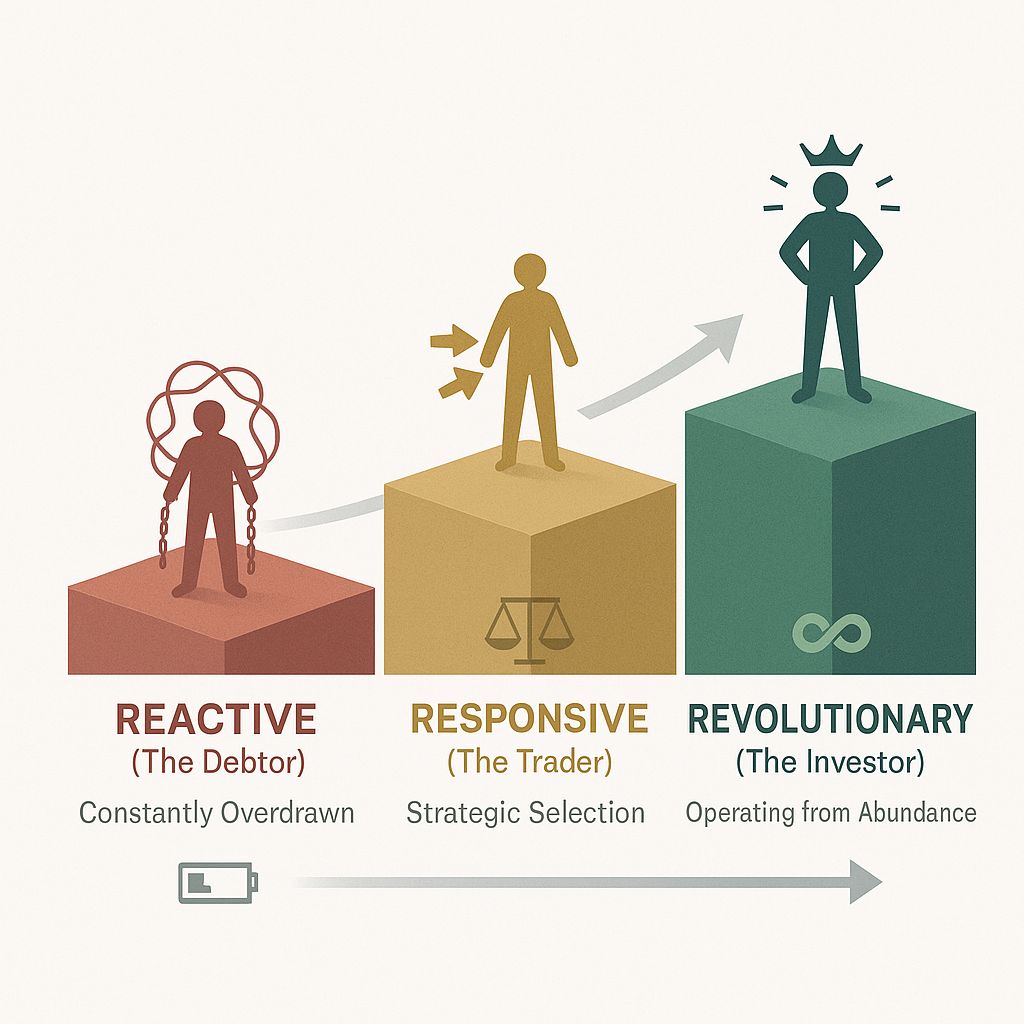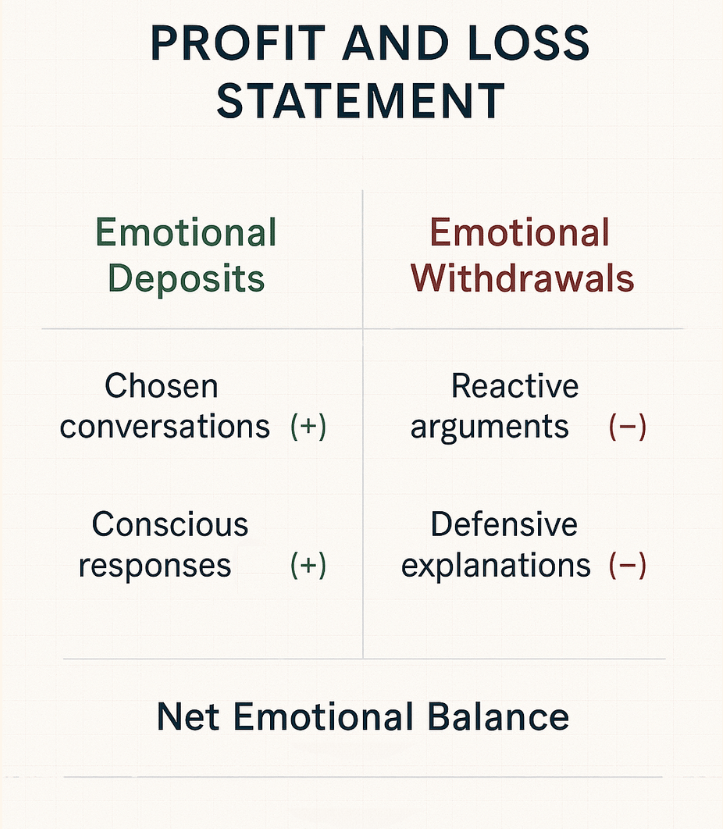Your friend drops the bomb: "You never really cared."
Wait. They forgot your birthday. Cancelled three times. Left you on read during your crisis.
But here you are, typing paragraphs. Pulling receipts. Listing every time you showed up.
The hurt one has become the defender. The wounded one is now on trial.
Congratulations. You just made them rich.
Not with money, with something far more valuable: your emotional energy.
You're not in relationships. You're in emotional transactions. And most of us are trading at a devastating loss.

Every interaction operates on an invisible balance sheet.
When someone provokes you and you react, you're not just responding, you're completing a transaction.
They deposit your energy. You experience the withdrawal.
The most successful manipulators aren't conscious villains. They're unconscious traders who've learned that your reactions fuel their sense of control, importance, and power.
The first principle is that you must not fool yourself and you are the easiest person to fool.
THE REACTION MARKETPLACE 📊
Watch closely next time someone baits you:
They present the stimulus (the offer)
You provide the reaction (the payment)
They receive emotional validation (the profit)
You're left depleted (the loss)
This is how it looks like in real life:
They drop the comment: "You've changed." (After you stopped saying yes to everything)
You take the bait: "What do you mean? I'm still the same person. Is this about Tuesday? I told you I had that deadline..."
You hear yourself explaining. Listing reasons. Your stomach tightens. Why are you defending growing up?
They get what they wanted: "I'm not the only one who's noticed."
They've said eight words. You'll spend eight hours thinking about them.
Replaying conversations. Checking if you really have changed. Maybe you should've gone on Tuesday.
The final tally: They confirmed their power, your growth threatens them, and now you know it.
You? You're second-guessing healthy boundaries you worked months to build.
This is the economics of psychology. And like any market, once you understand the mechanics, you can choose whether to participate.

THE SILENT INVESTMENT STRATEGY 🔇
1. STRATEGIC SILENCE
The calculated pause. You see the bait, recognise the game, and consciously choose non-engagement.
This isn't avoidance, it's assessment. You're reading the market before deciding whether to trade.
Example
Someone makes that comment about your parenting. Again.
Instead of defending, you pause, smile, and say, "That's interesting, I'll think about that."
The conversation shifts. They now left holding their own judgment.
2. PEACEFUL SILENCE
The centred non-reaction. You're so grounded in your own worth that provocations don't register as opportunities for transaction.
This confuses manipulators, they're offering currency you no longer value.
Example
Your friend constantly creates drama, then calls you for hours of emotional support.
This time, when the crisis text arrives, you respond eight hours later with: "Hope you're feeling better."
No questions. No feeding the cycle. The drama mysteriously resolves itself.
3. POWERFUL SILENCE
The sovereign non-participation. You've transcended the entire economy. You're not fighting, defending, or explaining.
You've simply opted out of trades that don't serve your growth.
Example
The family WhatsApp group erupts in political debate. Your uncle tags you directly, demanding your position.
You don't engage. Not because you don't have opinions, but because you recognise this isn't dialogue, it's emotional wrestling.
Your silence speaks: "I love you all, but I'm not available for this."

Each silence compounds differently: Strategic silence saves capital. Peaceful silence generates interest. Powerful silence creates wealth
The ability to observe without evaluating is the highest form of intelligence.
THE EMOTIONAL BANK ACCOUNT 💰
Any relationship, personal or professional, operates like a bank account. You can't withdraw indefinitely. It requires deposits and withdrawals, and in profound bonds, the ratio tips heavily toward deposits.
Sometimes there's an overdraft. Your teenager slams doors for weeks. Your partner withdraws during stress. Your friend disappears in their depression.
But like any overdraft, it's temporary and comes with interest, not as penalty, but as acknowledgment that someone letting you withdraw continuously isn't emotionally sustainable, even with the best intentions.
The question becomes: Are you making deposits or just demanding withdrawals?
THREE STAGES OF EVOLUTION 🚀
1. REACTIVE (The Debtor)
You respond to every provocation. Your emotional account is constantly overdrawn. Others make withdrawals at will.
Example
Your cousin mentions your career choices at dinner?
You're defending for an hour. Bring up that thing from childhood? You're suddenly twelve again, arguing the same argument.
You leave family gatherings exhausted, wondering why you can't just let things go.
2. RESPONSIVE (The Trader)
You choose which transactions to engage. You've learned to read the market. Some trades are worth it, most aren't.
Example
Your colleague drops subtle digs in meetings.
Before, you'd counter each one. Now, you respond only to substantive points. The digs get no energy.
Surprisingly, they stop. Without your reaction to fuel them, the behaviour becomes pointless.
3. REVOLUTIONARY (The Investor)
You've built such emotional wealth that you operate from abundance. Your silence isn't empty, it's full of choice. You invest energy only where it multiplies.
Example
Your ex-partner sends a long text listing your failures.
Old you would've matched it point by point.
Revolutionary you reads it, feels compassion for their pain, and responds: "I hope you find peace."
Not from superiority, but from genuine abundance. You have nothing to prove because you're not in that economy anymore.

This isn't about becoming cold or disconnected. It's about becoming sovereign.
When you stop reacting, something profound happens: the other person is left holding their own provocation. They must face what they're really seeking and why your energy was so important to them.
PSYCHOLOGICAL NON-VIOLENCE 📋
1. RECOGNISE the transaction being offered. Is this bait or genuine communication? What's the emotional ROI here?
Example
Your boss criticises your project in front of the team.
Before responding, you quickly assess: Is this constructive feedback (deposit) or power play (withdrawal)? The tone tells you everything.
2. PAUSE before any transfer, Let the neurological surge pass. Access your prefrontal cortex.
3. CHOOSE your investment level: Full engagement (rare, high-value); Minimal response (functional only); Complete non-participation (default).
Example
Boss was grandstanding? Minimal response: "I'll review that and get back to you."
Boss has valid concerns? Full engagement: "You're right, let's discuss how to improve this after the meeting."
Boss is just venting? Non-participation: Nodded acknowledgment, no verbal response.

Keep an eye on your emotional P&L. Observe every transaction. Value your returns.
Most people discover they've been emotionally bankrupt without knowing it.
REVOLUTION BY NON-REACTION 💫
Here's the paradox: The people who need your reactions most are often the ones you love most. They've learned that provoking you is how they feel connected, important, alive.
When you stop playing, you're not punishing them. You're freeing both of you.
You're saying: "Let's find a better currency. Let's trade in growth, not drama. Let's invest in building, not battling."
Your silence isn't withdrawal. It's the highest form of presence.
It says, "I'm so here, so centred, so certain of my worth that I don't need to prove anything to anyone, including myself."
Remember, the strings were never tied to you, they were tied to your need to respond.
And, the most powerful thing you'll do today?
Nothing!
Until next week,
love,
aayush
hustle peacefully!

